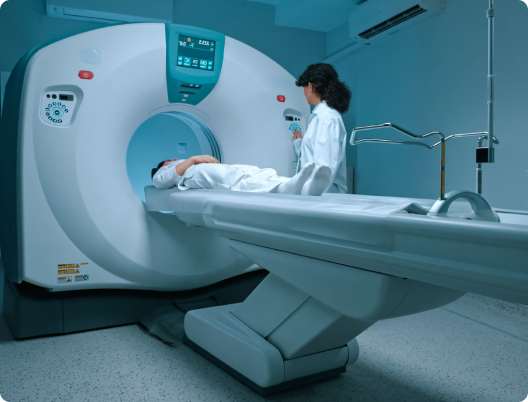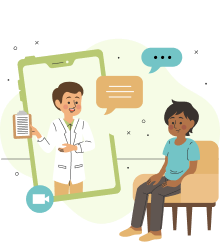
Hyderabad
Starting only @ ₹6250 ₹3750



A CT scan (Computed Tomography scan) is a short, non-invasive imaging test which gives a detailed view of your body. The doctor is able to visualize bones, organs, blood vessels and soft tissues. Unlike a basic X-ray, CT machines rotate around your body and capture cross-sectional images from various angles. The combination of these images forms a clear, 3D view, allowing your doctor to detect even the small issues such as internal bleeding, tumors, or blockages with high precision.
Doctors often advise CT scans when they require quick answers. It can be in the case of an injury, before a medical/surgical procedure to monitor how a condition is progressing. At Pristyn Care Zoi Hospital, for CT scan, we employ advanced, low radiation scanners that provide real-time sharp images with faster outcomes and more patient comfort. Book an appointment now.
Leave your name & phone number with us.
We will reach out to you to understand your requirements.
Lab details & charges will be shared with you over the call.
We’ll book your test as per your preferred date and time slot.
Leave your name & phone number with us.
We will reach out to you to understand your requirements.
Lab details & charges will be shared with you over the call.
We’ll book your test as per your preferred date and time slot.
Step-by-step instructions for a CT Scan preparation:

Some CT scans, especially for the abdominal or pelvic region, may also need gender-specific preparation.
For Male Patients:
For Female Patients:

| CT Scan | MRI | X-ray |
| Use of X-rays for creating 3D, cross-sectional images | Use of magnetic fields and radio waves, without radiation | Use of quick burst of radiation to produce 2D images |
| Best for view bones, internal bleeding, and complex organ injuries | Preferred to scan soft tissues like brain, muscles, ligaments, spinal cord | Usecheck bones, joints, and chest/lung conditions |
| Takes only a few minutes to complete; widely available in emergencies | Longer scan time (20–45 mins); often louder and you must stay stilll | Quickest imaging (seconds); limited detail compared to CT/MRI |
| Moderate radiation exposure | No exposure to radiation | Quite low exposure to radiation |

| Feature | Contrast CT Scan | Non-Contrast CT Scan |
|---|---|---|
| Definition | CT scan is done after injecting a contrast dye for highlighting areas. | CT scan is done without using any dye or contrast material. |
| Use of Contrast Dye | Yes, dye is either taken orally or injected into a vein | No use of contrast dye |
| Purpose | Clearly highlights blood vessels, tumors, infections, and organs. | Suitable in detecting fractures, bleeding, stones, or lung issues. |
| Detail Level | Offers highly defined images of soft tissues and blood flow. | Captures general structure, bones, and solid abnormalities. |
| Commonly Used For | Brain tumors, heart blockages, abdominal infections, cancers, angiography. | Head injuries, kidney stones, lung scans, fractures. |
| Time Taken | Takes a bit longer due to prep and dye administration. | Usually quicker, no major prep required. |
| Safety Consideration | Not advised in patients with kidney issues or contrast allergy. | Safer option for people with kidney problems or allergies. |
| Cost | Usually higher due to use of contrast material. | More affordable. |
Dedicated Support to Find Best Centers
Top NABL & NABH Accredited Centers
Get Up to 40% Discount on the Tests
Get Priority Appointment for Your Scans
There’s no strict age limit. If there is a need for a CT scan, doctors advise it at any age, even for younger kids or older adults. It is decided after carefully weighing the benefits and safety.
Doctors don’t recommend CT scans during pregnancy unless there is dire need. For instance, it may become necessary if you have severe kidney problems, history of allergy to contrast dye, the doctor first explores safer alternatives.
There’s no fixed limit for all, frequent CT scans increase your lifetime radiation exposure. Doctors suggest no more than 1–2 scans a year unless a patient’s critical medical condition needs closer tracking. They prescribe each scan after carefully weighing the risks.
Most people don’t feel anything unusual. In case of using contrast dye CT scan, you may get warm sensations or have a metallic taste for a few seconds. It is rare to have any serious side effects and your care team remains alert throughout the process.
CT Scan and MRI are not the same. A CT scan uses X-rays, whereas in an MRI, magnetic fields and radio waves are used. CT is quicker and better for bones and emergencies. However, MRI gives clearer images of soft tissues such as the brain, spine, and joints.
No, a CT scan isn’t painful. You just have to lie down and remain still as the machine takes images, no injections are needed unless contrast dye is used.
For most scans, yes you can eat light. However, if your scan includes contrast dye, the doctor asks you to fast for a few hours before the test.
A CT scan uses more radiation than a regular X-ray, but it’s still within safe limits when done under medical guidance.
The scan itself usually takes 10–15 minutes. If contrast is involved, the total time may be around 30 minutes.
Yes, especially if you’re taking metformin. Let your doctor know in advance that they may adjust your dose or schedule to avoid interactions with contrast dye.